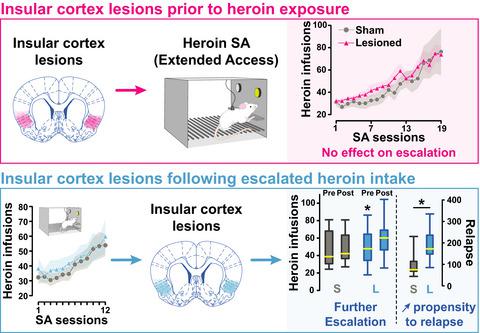当前位置:
X-MOL 学术
›
Eur. J. Neurosci.
›
论文详情
Our official English website, www.x-mol.net, welcomes your
feedback! (Note: you will need to create a separate account there.)
The anterior insular cortex in the rat exerts an inhibitory influence over the loss of control of heroin intake and subsequent propensity to relapse
European Journal of Neuroscience ( IF 2.7 ) Pub Date : 2020-07-03 , DOI: 10.1111/ejn.14889 Dhaval D. Joshi 1 , Mickaël Puaud 1 , Maxime Fouyssac 1 , Aude Belin‐Rauscent 1 , Barry Everitt 1 , David Belin 1
European Journal of Neuroscience ( IF 2.7 ) Pub Date : 2020-07-03 , DOI: 10.1111/ejn.14889 Dhaval D. Joshi 1 , Mickaël Puaud 1 , Maxime Fouyssac 1 , Aude Belin‐Rauscent 1 , Barry Everitt 1 , David Belin 1
Affiliation

|
The anterior insular cortex (AIC) has been implicated in addictive behaviour, including the loss of control over drug intake, craving and the propensity to relapse. Evidence suggests that the influence of the AIC on drug‐related behaviours is complex as in rats exposed to extended access to cocaine self‐administration, the AIC was shown to exert a state‐dependent, bidirectional influence on the development and expression of loss of control over drug intake, facilitating the latter but impairing the former. However, it is unclear whether this influence of the AIC is confined to stimulant drugs that have marked peripheral sympathomimetic and anxiogenic effects or whether it extends to other addictive drugs, such as opiates, that lack overt acute aversive peripheral effects. We investigated in outbred rats the effects of bilateral excitotoxic lesions of AIC induced both prior to or after long‐term exposure to extended access heroin self‐administration, on the development and maintenance of escalated heroin intake and the subsequent vulnerability to relapse following abstinence. Compared to sham surgeries, pre‐exposure AIC lesions had no effect on the development of loss of control over heroin intake, but lesions made after a history of escalated heroin intake potentiated escalation and also enhanced responding at relapse. These data show that the AIC inhibits or limits the loss of control over heroin intake and propensity to relapse, in marked contrast to its influence on the loss of control over cocaine intake.
中文翻译:

大鼠前岛突皮质对海洛因摄入控制的丧失和随后的复发倾向具有抑制作用
前岛叶皮层(AIC)与成瘾行为有关,包括失去对药物摄入的控制,渴望和复发倾向。有证据表明,AIC对药物相关行为的影响是复杂的,因为在长时间接触可卡因自我管理的大鼠中,AIC被证明对失去控制的发展和表达具有状态依赖性的双向影响过度吸毒,为后者提供了便利,但损害了前者。但是,尚不清楚AIC的这种影响是否仅限于具有明显的拟交感神经作用和促焦虑作用的兴奋性药物,或者是否扩展至其他缺乏明显的急性厌恶性外周作用的成瘾性药物,例如鸦片类药物。我们在远距离大鼠中调查了长期接触海洛因自我给药之前或之后诱发的AIC的双侧兴奋性双侧毒害损害对海洛因摄入量增加和维持的发展和维持以及禁欲后随后复发的影响。与假手术相比,暴露前的AIC病变对控制海洛因摄入量的丧失没有任何影响,但是在经历了海洛因摄入量增加的病史后,皮损增加了,并且在复发时反应也增强了。这些数据表明,AIC抑制或限制了对海洛因摄入量的控制丧失和复发倾向,这与其对可卡因摄入量失去控制的影响形成鲜明对比。海洛因摄入量增加的发展和维持以及禁欲后随后易复发的问题。与假手术相比,暴露前的AIC病变对控制海洛因摄入量的丧失没有任何影响,但是在经历了海洛因摄入量增加的病史后,皮损增加了,并且在复发时反应也增强了。这些数据表明,AIC抑制或限制了对海洛因摄入量的控制丧失和复发倾向,这与其对可卡因摄入量失去控制的影响形成鲜明对比。海洛因摄入量增加的发展和维持以及禁欲后随后易复发的问题。与假手术相比,暴露前的AIC病变对控制海洛因摄入量的丧失没有任何影响,但是在经历了海洛因摄入量增加的病史后,皮损增加了,并且在复发时反应也增强了。这些数据表明,AIC抑制或限制了对海洛因摄入量的控制丧失和复发倾向,这与其对可卡因摄入量失去控制的影响形成鲜明对比。但在有海洛因摄入量增加的病史后出现的病灶会增强病情的恶化,并且还会增强复发时的反应能力。这些数据表明,AIC抑制或限制了对海洛因摄入量的控制丧失和复发倾向,这与其对可卡因摄入量失去控制的影响形成鲜明对比。但在有海洛因摄入量增加的病史后出现的病灶会增强病情的恶化,并且还会增强复发时的反应能力。这些数据表明,AIC抑制或限制了对海洛因摄入量的控制丧失和复发倾向,这与其对可卡因摄入量失去控制的影响形成鲜明对比。
更新日期:2020-07-03
中文翻译:

大鼠前岛突皮质对海洛因摄入控制的丧失和随后的复发倾向具有抑制作用
前岛叶皮层(AIC)与成瘾行为有关,包括失去对药物摄入的控制,渴望和复发倾向。有证据表明,AIC对药物相关行为的影响是复杂的,因为在长时间接触可卡因自我管理的大鼠中,AIC被证明对失去控制的发展和表达具有状态依赖性的双向影响过度吸毒,为后者提供了便利,但损害了前者。但是,尚不清楚AIC的这种影响是否仅限于具有明显的拟交感神经作用和促焦虑作用的兴奋性药物,或者是否扩展至其他缺乏明显的急性厌恶性外周作用的成瘾性药物,例如鸦片类药物。我们在远距离大鼠中调查了长期接触海洛因自我给药之前或之后诱发的AIC的双侧兴奋性双侧毒害损害对海洛因摄入量增加和维持的发展和维持以及禁欲后随后复发的影响。与假手术相比,暴露前的AIC病变对控制海洛因摄入量的丧失没有任何影响,但是在经历了海洛因摄入量增加的病史后,皮损增加了,并且在复发时反应也增强了。这些数据表明,AIC抑制或限制了对海洛因摄入量的控制丧失和复发倾向,这与其对可卡因摄入量失去控制的影响形成鲜明对比。海洛因摄入量增加的发展和维持以及禁欲后随后易复发的问题。与假手术相比,暴露前的AIC病变对控制海洛因摄入量的丧失没有任何影响,但是在经历了海洛因摄入量增加的病史后,皮损增加了,并且在复发时反应也增强了。这些数据表明,AIC抑制或限制了对海洛因摄入量的控制丧失和复发倾向,这与其对可卡因摄入量失去控制的影响形成鲜明对比。海洛因摄入量增加的发展和维持以及禁欲后随后易复发的问题。与假手术相比,暴露前的AIC病变对控制海洛因摄入量的丧失没有任何影响,但是在经历了海洛因摄入量增加的病史后,皮损增加了,并且在复发时反应也增强了。这些数据表明,AIC抑制或限制了对海洛因摄入量的控制丧失和复发倾向,这与其对可卡因摄入量失去控制的影响形成鲜明对比。但在有海洛因摄入量增加的病史后出现的病灶会增强病情的恶化,并且还会增强复发时的反应能力。这些数据表明,AIC抑制或限制了对海洛因摄入量的控制丧失和复发倾向,这与其对可卡因摄入量失去控制的影响形成鲜明对比。但在有海洛因摄入量增加的病史后出现的病灶会增强病情的恶化,并且还会增强复发时的反应能力。这些数据表明,AIC抑制或限制了对海洛因摄入量的控制丧失和复发倾向,这与其对可卡因摄入量失去控制的影响形成鲜明对比。











































 京公网安备 11010802027423号
京公网安备 11010802027423号